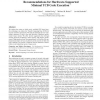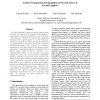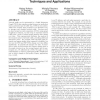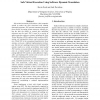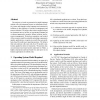28 search results - page 5 / 6 » Secure Isolation of Untrusted Legacy Applications |
ASPLOS
2008
ACM
13 years 9 months ago
2008
ACM
We explore the extent to which newly available CPU-based security technology can reduce the Trusted Computing Base (TCB) for security-sensitive applications. We find that although...
ACSAC
2004
IEEE
13 years 11 months ago
2004
IEEE
We have developed a mechanism which prevents abuse of trusted Java applets, such as digitally signed applets. A signed applet is usually permitted by a user to perform certain fun...
CONEXT
2009
ACM
13 years 8 months ago
2009
ACM
Network traffic can be represented by a Traffic Dispersion Graph (TDG) that contains an edge between two nodes that send a particular type of traffic (e.g., DNS) to one another. T...
ACSAC
2002
IEEE
14 years 9 days ago
2002
IEEE
Safe virtual execution (SVE) allows a host computer system to reduce the risks associated with running untrusted programs. SVE prevents untrusted programs from directly accessing ...
SIGOPSE
1998
ACM
13 years 11 months ago
1998
ACM
The majority of work on protection in single-language mobile code environments focuses on information security issues and depends on the language environment for solutions to the ...
